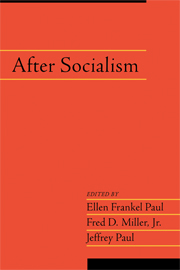Book contents
- Frontmatter
- Contents
- Introduction
- Acknowledgments
- Contributors
- Can There Be an “After Socialism”?
- The Cultural Contradictions of Socialism
- The Idol of History
- Backwards into the Future: Neorepublicanism as a Postsocialist Critique of Market Society
- What's Left of the Welfare State?
- The Roots and Rationale of Social Democracy
- An Interpretation and Defense of the Socialist Principle of Distribution
- Some Feasible Alternatives to Conventional Capitalism
- After Socialism: Mutualism and a Progressive Market Strategy
- Sovereignty, Commerce, and Cosmopolitanism: Lessons from Early America for the Future of the World
- Beyond Fear and Greed?
- Liberalism's Divide, After Socialism and Before
- INDEX
Can There Be an “After Socialism”?
Published online by Cambridge University Press: 01 June 2010
- Frontmatter
- Contents
- Introduction
- Acknowledgments
- Contributors
- Can There Be an “After Socialism”?
- The Cultural Contradictions of Socialism
- The Idol of History
- Backwards into the Future: Neorepublicanism as a Postsocialist Critique of Market Society
- What's Left of the Welfare State?
- The Roots and Rationale of Social Democracy
- An Interpretation and Defense of the Socialist Principle of Distribution
- Some Feasible Alternatives to Conventional Capitalism
- After Socialism: Mutualism and a Progressive Market Strategy
- Sovereignty, Commerce, and Cosmopolitanism: Lessons from Early America for the Future of the World
- Beyond Fear and Greed?
- Liberalism's Divide, After Socialism and Before
- INDEX
Summary
There is no “after socialism.” There will not be in our or in our children's lifetimes an “after socialism.” In the wake of the Holocaust and the ruins of Nazism, anti–Semitism lay low a bit, embarrassed by its worst manifestation, its actual exercise of state dominion. In the wake of the collapse of Communism, socialism's only real and full experience of power, socialism too lays low for just a moment. Socialism's causes in the West, however, remain ever with us, the product of the convergence of two extraordinary achievements: liberal free enterprise and political democracy. The former creates wealth that has transformed all human possibility, but it also gives rise to particularly deep envy. The latter allows ambition a route to power by an appeal to the democratic state to seize and redistribute wealth in the name of social equality. As Friedrich Hayek and Ludwig von Mises understood perfectly, the bounty of free enterprise leads the unproductive to believe that such wealth is a fact of nature, there for the taking.
Socialism means the abolition of private property, profit, and voluntary exchange. It means the organization of the production and distribution of goods and services—that is, of the fruits of human invention, innovation, thought, risk, talent, and labor—by political planners who allegedly know both what people need and how to satisfy that need. It means the expropriation and allotment of wealth according to those planners' sense of value. Socialism may be understood by any child.
- Type
- Chapter
- Information
- After Socialism , pp. 1 - 17Publisher: Cambridge University PressPrint publication year: 2003

